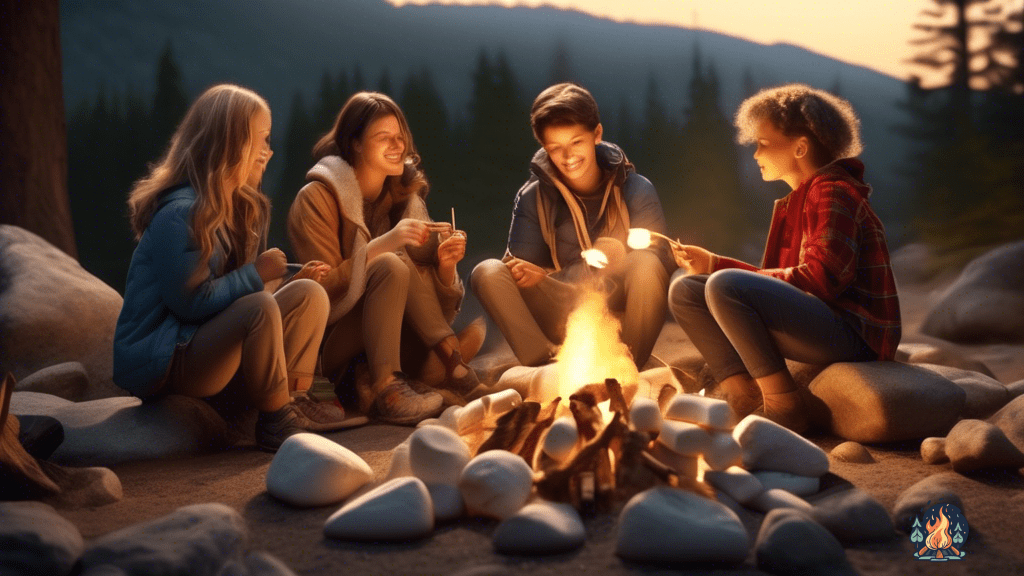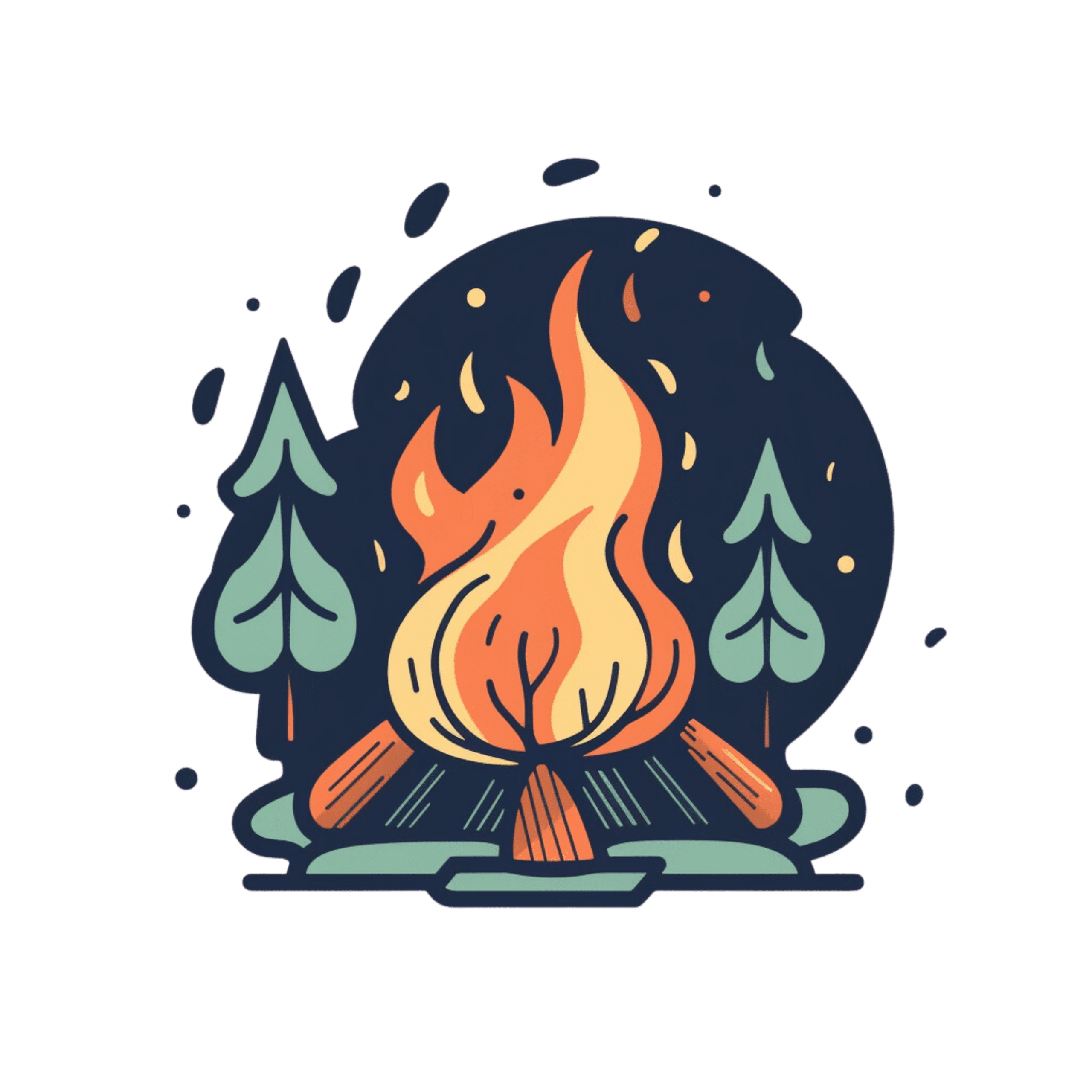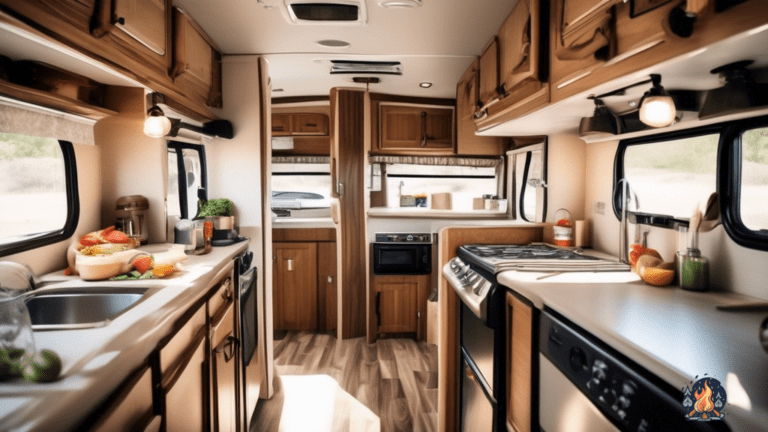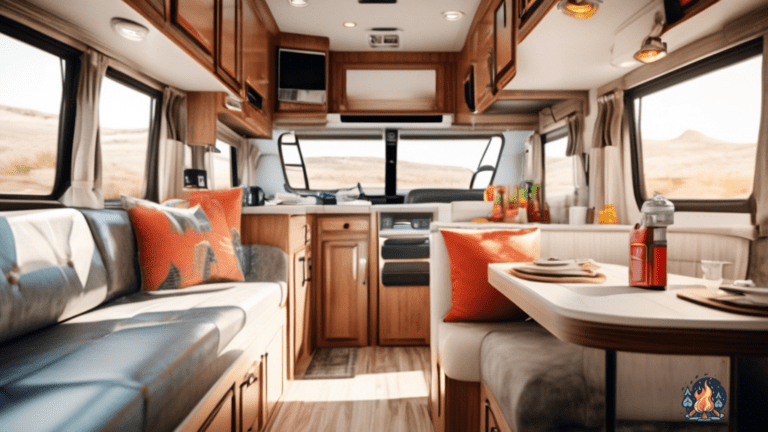Practicing Safe Campfire Techniques
by Kevin Fairbanks • Updated: January 30, 2024
Discover the essential techniques for safe campfire practices and ensure worry-free outdoor adventures. Click now to learn from our experts and make your nights around the campfire unforgettable!

Have you ever gone camping and had a campfire that got a little out of control? Maybe the flames started licking at the surrounding trees, or perhaps a rogue ember landed on your friend’s marshmallow and set it ablaze. Well, fear not dear camper, because in this article we will teach you the art of practicing safe campfire techniques! So grab your s’mores ingredients and get ready to become a campfire safety pro.
Now, picture this: you’re out in the wilderness, surrounded by towering trees and a sky full of stars. You’ve found the perfect spot to set up camp, and you’re itching to start a cozy campfire. But before you do, let’s talk about the importance of choosing a safe location for your campfire. You don’t want to accidentally start a forest fire or singe your eyebrows, do you? No, of course not!
So, we’ll guide you through the process of preparing the fire pit, gathering and preparing firewood, building and lighting the campfire, and finally, extinguishing and cleaning up the fire site. By the end of this article, you’ll be equipped with all the knowledge you need to have a safe and enjoyable campfire experience. So, let’s dive in and master the art of practicing safe campfire techniques!
Key Takeaways
- Choose a safe location for your campfire
- Gather and prepare firewood properly
- Follow the steps for building and lighting a campfire
- Extinguish and clean up the fire site properly, disposing of ashes in a designated area
Choosing a Safe Location for Your Campfire
Now that you know the importance of practicing safe campfire techniques, let’s talk about choosing a safe location for your campfire.
Picture this: you’ve set up your tent, unpacked your marshmallows, and you’re ready to start roasting. But hold up! Before you start tossing those marshmallows into the flames, you need to make sure you’ve chosen a safe location for your campfire. And no, I don’t mean right next to the tent where it can catch fire faster than you can say "s’mores".
When it comes to picking a spot for your campfire, there are a few key things to keep in mind.
First off, you want to make sure you’re far away from any overhanging branches or low-hanging power lines. Trust me, you don’t want a singed marshmallow AND a singed hairdo.
Secondly, be mindful of your surroundings. Avoid setting up campfires near dry grass or flammable materials. We’re here to roast marshmallows, not start a wildfire.
Lastly, remember to keep a safe distance from your tent. It may seem convenient to have the fire right next to you, but it’s not worth the risk. You don’t want to end up sleeping under the stars because your tent went up in flames.
So, choose wisely, my friend, and let the campfire fun begin!
Preparing the Fire Pit
To get the fire pit ready, start by clearing any debris and creating a ring of rocks. You don’t want any unwanted guests like leaves, twigs, or even small woodland creatures joining your campfire party. So, grab a broom or a rake and sweep away all the debris from the area. Once that’s done, it’s time to create your majestic ring of rocks. Think of it as your fire’s bodyguard, protecting it from any potential threats. Arrange the rocks in a circle, making sure they’re sturdy enough to withstand the heat of the flames. And voila! You now have a fire pit that’s ready to bring warmth and light into your camping adventure.
Now, let’s take a moment to appreciate the beauty of a well-prepared fire pit. Picture this: a crackling fire, dancing flames, and the sweet smell of s’mores in the air. But wait, there’s more! To truly capture the essence of a safe and enjoyable campfire experience, let me introduce you to a table that will make your head spin with delight.
| Campfire Safety Tips | Remember, Safety First! | A Little Extra Fun |
|---|---|---|
| 1. Keep a bucket of water nearby for emergencies | You never know when a marshmallow might burst into flames! | Plus, you can use it to douse the fire when you’re done. |
| 2. Avoid using flammable liquids to start the fire | We’re here for a cozy campfire, not a science experiment gone wrong! | Stick to the good ol’ fire starters or kindling. |
| 3. Never leave the fire unattended | Your fire can get lonely too, so keep an eye on it! | Plus, you don’t want any wandering forest creatures getting too close. |
So there you have it, the secrets to preparing a fire pit that will not only keep you safe but also bring a little extra fun to your camping experience. Now, go forth and conquer the art of campfire magic!
Gathering and Preparing Firewood
Gather up enough firewood to keep your campfire burning brightly through the night, like a stack of golden logs ready to ignite.
Here are some tips to help you gather and prepare firewood like a seasoned camper:
- Scout the area: Channel your inner explorer and go on a scavenger hunt for fallen branches and logs. Check out the surrounding area for dead trees or branches that can be safely harvested for firewood. Just make sure you’re not trespassing on someone else’s property, unless you want to be the star of your own camping horror story.
- Size matters: When selecting firewood, remember that size does matter. Look for pieces that are about the width of your wrist, so they can easily fit into the fire pit. Avoid using logs that are too long or too thick, unless you have a craving for a slow-cooked marshmallow that will take hours to roast.
- Dry it out: Don’t be fooled by wet wood that refuses to light up like a stubborn teenager. Opt for dry firewood that will catch fire faster than a fireman sliding down a pole. Dry wood not only ignites easily, but it also produces less smoke, allowing you to bask in the warm glow of your campfire without feeling like you’re at a barbecue gone wrong.
So, grab your trusty axe and venture into the wilderness to gather the perfect firewood for your campfire.
Just remember, the firewood you choose can make or break your camping experience, so choose wisely and make your campfire the envy of every s’mores lover around.
Building and Lighting the Campfire
Start by choosing a suitable location for lighting your campfire. You don’t want to set your tent on fire or accidentally burn down the entire forest, so it’s important to find a spot that is clear of any overhanging branches or dry grass.
And let’s be honest, nobody wants to wake up in the middle of the night to find a raccoon roasting marshmallows over your smoldering sleeping bag. So, use your common sense and find a nice open area where you can safely enjoy your campfire without any unexpected surprises.
Once you’ve found your perfect spot, it’s time to start building your campfire. Grab your carefully gathered firewood and arrange it in a teepee shape, leaving enough space in the middle for air to circulate.
Now, I know what you’re thinking, "Why do I need to build a teepee? I’m not trying to impress any woodland creatures with my architectural skills!" Well, my friend, the teepee shape allows for proper airflow, ensuring that your fire will burn efficiently and not smother itself out. It’s like giving your fire its very own personal oxygen supply, because who doesn’t want a little extra oxygen in their life?
Once your teepee is built, it’s time to light that bad boy up. Grab your trusty lighter or matches and carefully ignite the bottom of the teepee. And just like that, you’ve successfully built and lit your campfire!
Now, sit back, relax, and enjoy the warmth and crackling sounds of your masterpiece. Just remember to keep a bucket of water nearby, in case things start to get a little too hot to handle. Safety first, my friend!
What Practices Can I Implement to Ensure Safe Campfire Techniques?
When it comes to campfire safety, implementing the right campfire safety equipment essentials is crucial. Always keep a fire extinguisher, water source, and first aid kit nearby. Clear the surrounding area from any flammable materials and never leave the fire unattended. Practicing these techniques will ensure a safe and enjoyable campfire experience.
Extinguishing and Cleaning Up the Fire Site
When it’s time to put out your fire, remember to always douse it completely with water and carefully dispose of any remaining embers. You don’t want to be that person who leaves a smoldering fire behind like some kind of fire-breathing dragon.
So, grab your trusty water source and get ready to play firefighter! Here’s what you need to do:
- Splash that water like you’re in a water fight with Mother Nature herself. Make sure every inch of that fire is soaking wet. You want it to be as damp as a soggy sandwich left out in the rain.
- Stir the fire with a stick, just like you’re stirring a witches’ brew. This will help to cool down any hidden hotspots that might still be lurking beneath the surface. Don’t worry, you won’t turn into a toad. Probably.
- Once you’re confident that the fire is out, do a victory dance around the fire pit. You’ve successfully tamed the wild flames! But hold on, your job isn’t done yet. It’s time for the grand finale: cleaning up the fire site.
Cleaning up after a fire is like cleaning up after a wild party. You want to leave the place looking better than when you found it, just without the empty beer cans and questionable dance moves. Here’s what you need to do:
- Remove any debris or ashes from the fire pit. Think of it as cleaning up the aftermath of a volcanic eruption, minus the lava and dinosaurs. Sweep away all the remnants of your fiery adventure and make that fire pit sparkle like a freshly polished diamond.
- Dispose of the ashes in a designated area. Don’t just dump them willy-nilly like you’re in some kind of ash Olympics. Be responsible and find a proper ash disposal site. Maybe even whisper a little "thank you" to the ashes for keeping you warm and toasty through the night.
- Finally, take a moment to admire your work. You’ve not only extinguished the fire, but you’ve also left the fire site better than you found it. Give yourself a pat on the back and bask in the glory of being a responsible camper.
Frequently Asked Questions
How far should my campfire be from my tent or other combustible materials?
You want to keep your campfire at least 15 feet away from your tent or anything that can catch fire. Trust me, you don’t want to wake up to a flaming sleeping bag! Safety first, my friend!
Can I use gasoline or lighter fluid to start my campfire?
Using gasoline or lighter fluid to start a campfire is like trying to tame a wild dragon with a squirt gun. It’s not a safe or effective method. Stick to using dry kindling and fire starters instead.
Are there any specific types of wood that I should avoid using for my campfire?
Avoid using green or freshly cut wood for your campfire. It can be hard to light and produces more smoke. Plus, you don’t want your fire to sound like a sizzling sausage. Stick to dry, seasoned wood for a roarin’ good time!
Is it safe to leave my campfire unattended?
No, it’s not safe to leave your campfire unattended. Remember that time when your friend’s unattended fire turned into a raging inferno? Yeah, let’s avoid that. Keep an eye on your fire and be responsible.
What should I do if I accidentally start a wildfire while camping?
If you accidentally start a wildfire while camping, don’t panic! The most important thing is to notify authorities immediately. Then, use your camping skills to help contain the fire until help arrives. Stay calm and carry a fire extinguisher!

Hi, I’m Kevin, a lifelong camping enthusiast and the voice behind Campfire Discoveries. From tent to RV to cabin camping, I’ve explored it all. Join me as we share stories and tips around the campfire, deepening our connection with the great outdoors.
Keep Reading
-
Essential RV Cooking Safety Tips To Keep In Mind
Cooking in an RV? Learn the essential safety tips to protect yourself and your loved ones. Click now for crucial RV cooking safety guidelines to ensure a worry-free trip!
-
Essential Safety Equipment For Your RV: Tips For Beginners
Ensure a worry-free adventure on the road with these essential RV safety equipment tips for beginners. Stay safe and click now for expert advice!
-
Festival-Ready: Choosing The Perfect Tent For Music Festivals
Rock out in style at music festivals with the perfect tent! Find out how to choose the ideal tent for your festival adventure and stay comfortable while enjoying your favorite bands. Click here to find your festival-ready tent now!



